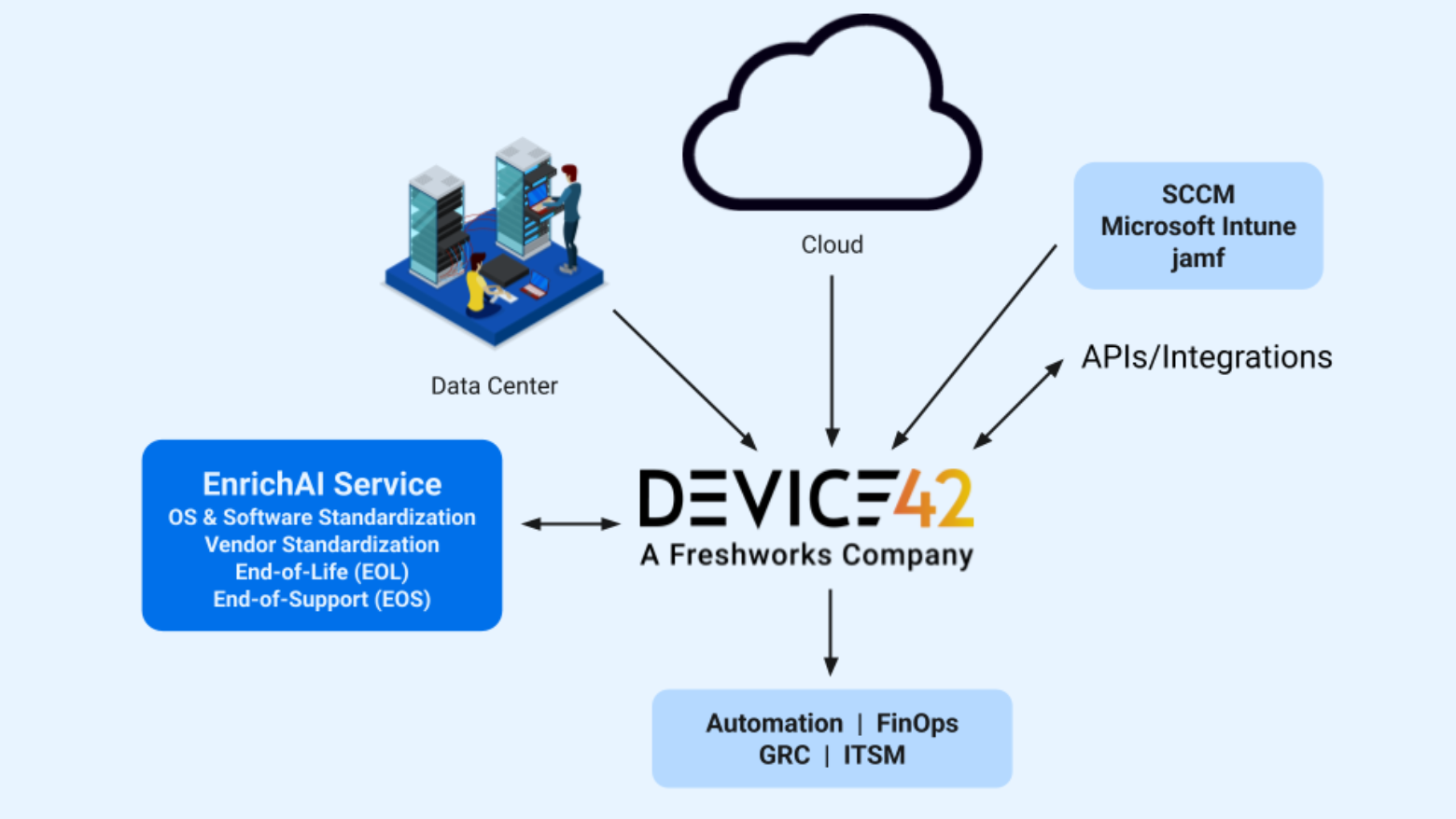Discover all IT assets using multiple protocols and gain complete visibility.
Device42 simplifies the precise mapping of your IT infrastructure using agentless, automated, device discovery tools and cloud API queries. These tools work discreetly behind the scenes, collecting inventory data from physical, virtual, and cloud assets to seamlessly update Device42’s Configuration Management Database (CMDB). This boosts efficiency, productivity, and transparency across your organization, providing a clear view of your assets.
Track IT resources across networks using standard protocols and secure collectors.
Device42 uses industry standard protocols (SNMP, IPMI, SSH, WMI, and others) and Cloud APIs to collect data where it leverages the least privileged account (e.g., read community string access for SNMP) done via standard protocols and ports. Device42 remote collector architecture allows discovery to securely take place across multiple segregated environments without requiring open ports across networks for scanning.
Primary discovery is agentless, but Device42 also offers an agent for remote devices or where security is a concern. Device42 adds new discoveries regularly based on customer requirements.
Flexible Scheduling and Updating
Device42 Discovery sync schedule gives flexibility and continuity with customizable jobs running hourly, daily, weekly, or on specific days and times.
Drive Efficiency With Automated Discovery Across Your Entire Network.
Device42 harnesses the capabilities of SNMP, the industry-standard for network equipment, and unlocks comprehensive discovery capabilities for identifying and tracking both physical and logical components, revealing their intricate relationships and interdependencies.
Our automated network discovery builds your Layer 2 (L2) network environment, importing network data on:
- Switches, Routers, and Firewalls Inventory
- IP-to-MAC Address Relationships
- MAC address-to-switch port relationships
- VLANs/Subnets
SNMP discovery extends to blade systems (IBM, HP, Dell, Fujitsu, Sun), offering chassis and blade-level details. It includes SAN storage inventory, data collection, and supports console switches and other SNMP-based devices. Cisco UCS is supported in a separate menu entry. Device42's SNMP discovery covers v1, v2c, and v3, and also discovers CDP/LLDP neighbors.
Device42 interfaces with IPMI/BMC boards (e.g., iDrac or iLo) to uncover device information. When connected to the IPMI interface, Device42 automatically identifies essential details such as hardware model, serial number, IP address, and MAC address associated with the BMC interface.
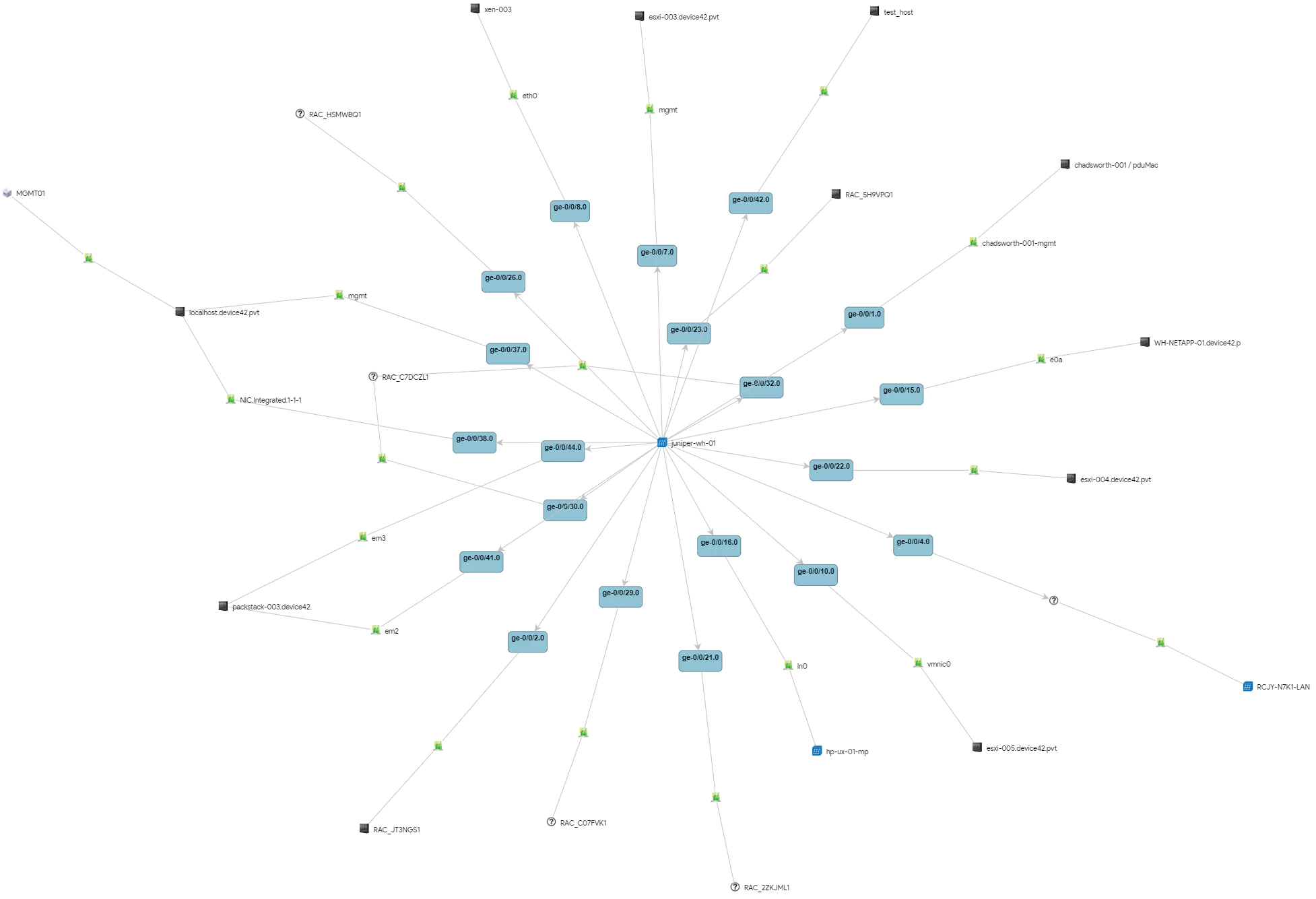
Discover cloud resources across AWS, Azure, GCP, Oracle, and more.
Device42 supports autodiscovery of cloud instances and resources on Amazon AWS, Microsoft Azure, Google GCP, Linode, DigitalOcean, OpenStack, Alibaba Cloud, and Oracle Cloud.
Device42 will autodiscover your cloud virtual machines, databases, and storage devices. You can then work with your cloud devices just like you would any other device. You can define application components, store passwords, create custom keys, and so on, just as you would for any other physical or virtual device.
Device42 queries the cloud-native APIs to get an inventory of all the relevant resources in your accounts and then it applies OS database and other discovery methodologies to give you a complete view of your resources.
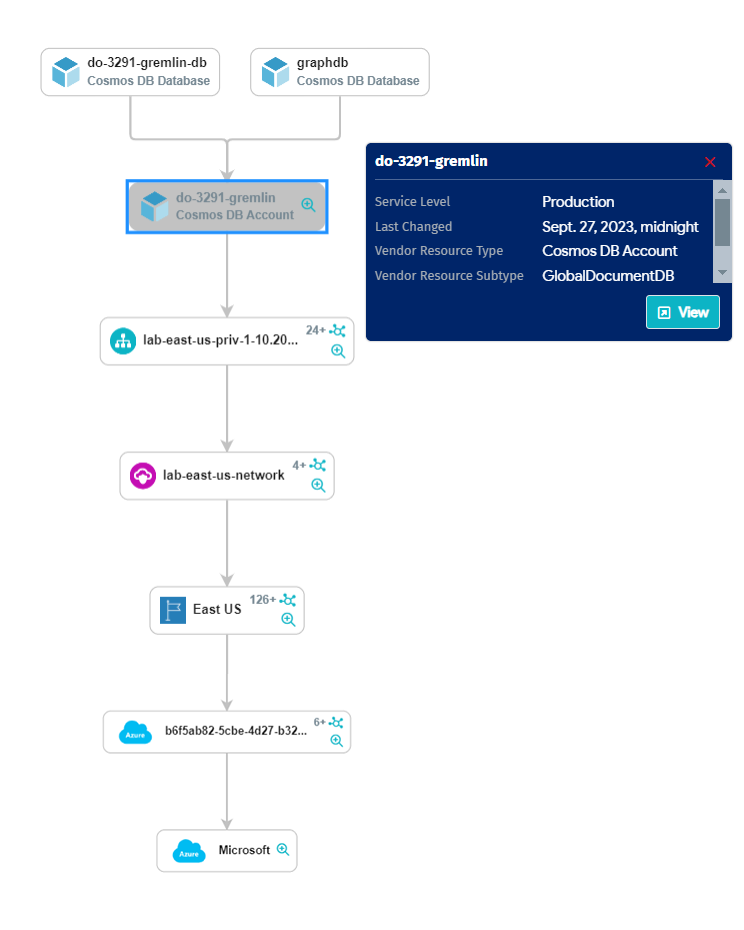
Discover All Software and SaaS Applications to Gain Full Operational Insight.
Device42 offers comprehensive software discovery for both on-premises and SaaS environments. It identifies installed applications, license models, and end-of-life details across Windows, Linux, and cloud platforms. By integrating with identity providers like Azure AD, Okta, and Google Workspace, Device42 captures user access, application usage, and role-based assignments, providing a unified view of your software landscape.
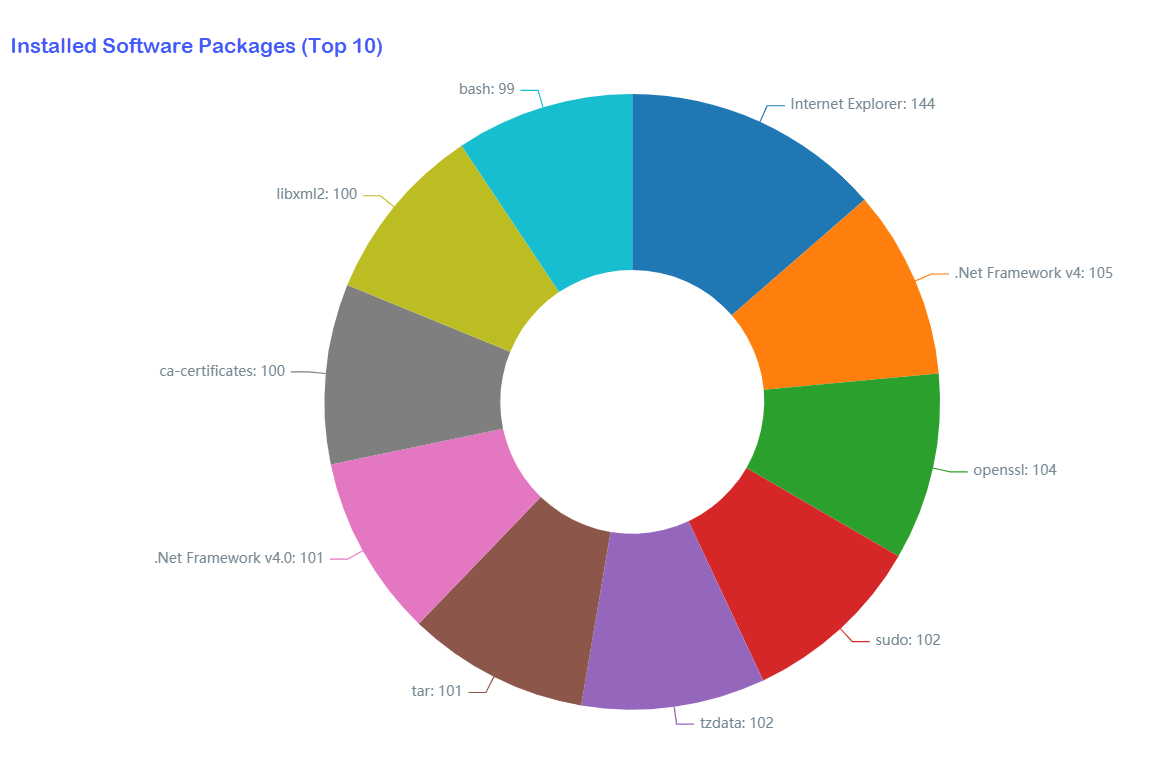
Uncover Complete Inventory Details Across Windows, Linux, and UNIX.
Forget about installing agents. Keeping your inventory information current on Windows has never been easier. Just like our seamless Windows discovery, we've got you covered for Linux and UNIX platforms as well. Discover a wide range of operating systems (OS), including Solaris, AIX, Redhat/CentOS, Ubuntu, SUSE Linux, BSD, and more.
- Core Information: Basic inventory information includes hostname, serial number, hardware model, and CPU/memory/hard disk details
- Operating Systems: Operating system with version number and build information
- Address Details: IP and MAC addresses and their relationships (automatically maps corresponding switch ports)
- Software: Installed software (including version number and installation date)
- Services: System services (running or stopped)
- Connections: Listening ports for all services and remote connections
- Dependencies: Service-to-service IP, port maps, and application dependency maps

Discover and Track Virtual Machines Across All Major Hypervisors With Ease.
Device42 provides complete visibility into your virtualized environment by seamlessly integrating with your hypervisors, effortlessly collecting host and virtual machine (VM) information. Scheduled discoveries ensure that your VM documentation remains current, even as VMs migrate across hosts.
- VMware vCenter and/or ESXi
- Citrix Xen
- oVirt/Redhat
- KVM/Xen/libvirt
- OpenVZ
- LXC
- Docker
- Cloudstack
- OpenStack
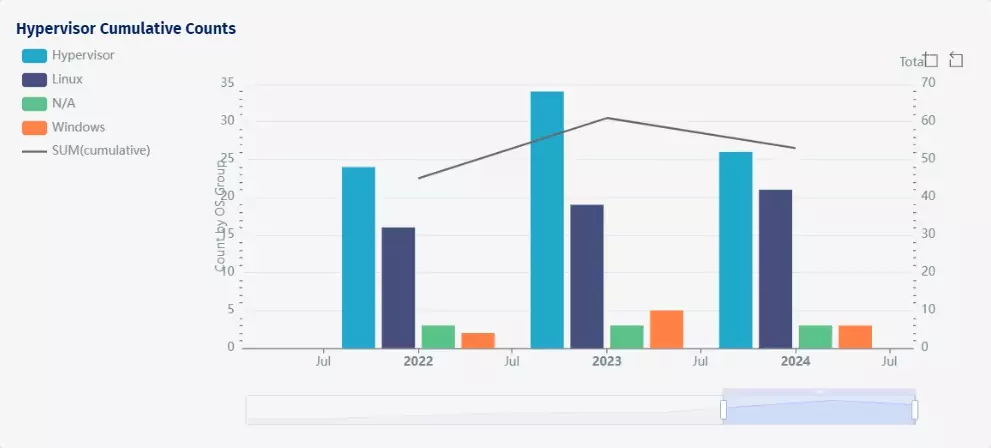
Uncover Database Instances, Connections, and Detailed Statistics Effortlessly.
Device42 Database Discovery seamlessly supports Windows and *nix-based discovery jobs, enabling you to uncover a variety of database types, including Microsoft SQL (MSSQL), Oracle, PostgreSQL, and DB2.
With this powerful tool at your fingertips, you can dive into the intricacies of your database instances:
- Explore databases on that instance, complete with access to in-depth database connection and size statistics.
- Navigate connections to that database instance with access to connection details.
- Gain insights into database size details, creation date, and path.
- Uncover additional details, including server start time, CPU count, memory information, and much more.
- For SQL cluster databases, details include: SQL Cluster Name, SQL Cluster Node Role, Active or Read-Replica status of the node, and whether the Passive Node utilizes Log Shipping or DB Mirroring.

Map and Explore Storage Arrays to Gain Full Visibility of Your Environment.
Within Storage Array Discovery, you will find resource details, related resources, and topology maps.
- Dell/EMC Arrays
- HP
- IBM
- Infinidat
- Netapp Filers
- Nutanix
- Oracle ZFS
- Pure Storage
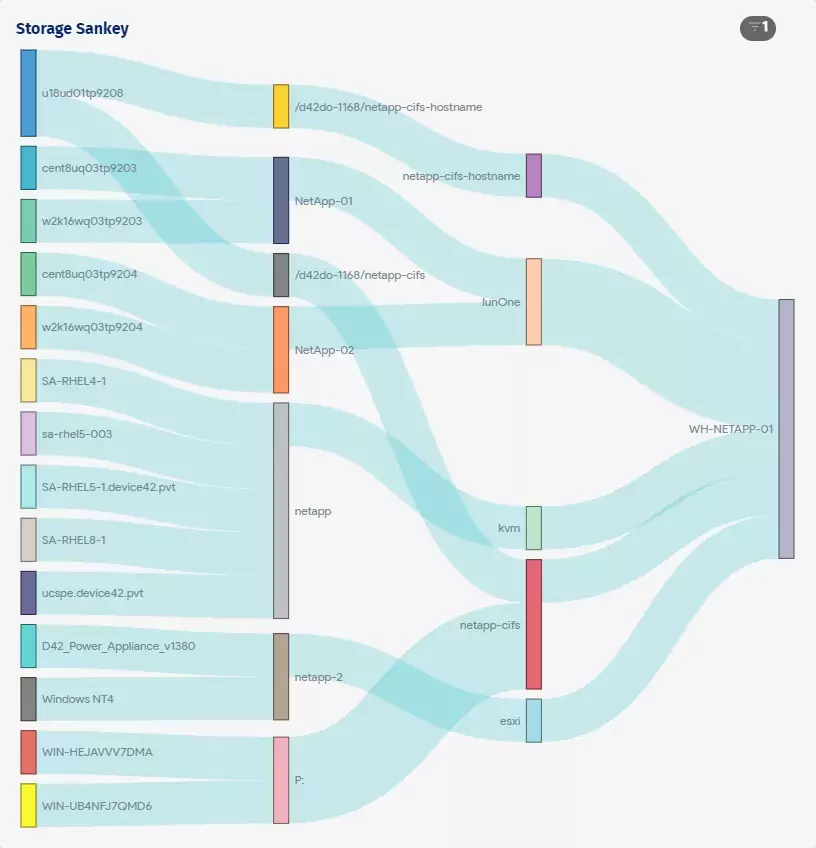
Uncover Load Balancer Inventory and Connections Across Your IT Environment.
Device42 seamlessly integrates SNMP and native APIs to connect with your load balancer, offering a comprehensive range of capabilities:
- Discovers essential inventory details including hardware model, serial number, hostname, and OS information.
- Identifies virtual servers, pools, and member nodes.
- Maps discovered member nodes with auto-discovered devices through other auto-discovery methods.
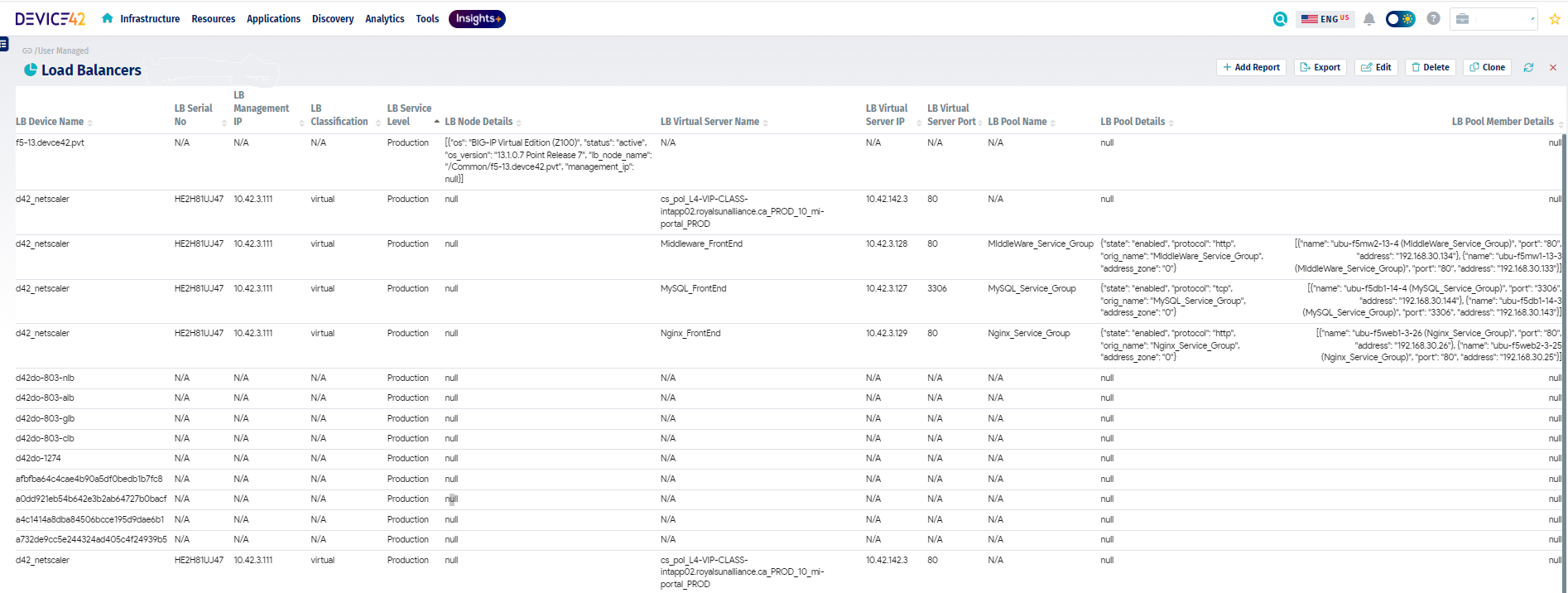
Discover Cisco UCS Assets for Full Visibility and Simplified Management.
Device42 Discovery for Cisco UCS Manager streamlines IT management and natively integrates with Cisco UCS Manager, automatically populating chassis, blade, and service profile details.
This integration empowers robust search capabilities within Device42, with automatic correlations between service profiles and blade devices.

Jumpstart Network Discovery Using IPs, Ranges, or CIDR Blocks for Fast, Full Visibility.
Discovery Hub is your first stepping stone into using Device42. By entering an IP, IP range, or CIDR block, a network scan is run. Once the scan completes, you can use the results to seamlessly start discovery jobs based on those categories. Once the jobs are created, you can tweak them, set schedules, and more. Discovery Hub is great if you don't know where to start, if you've acquired a network you don't know much about, or if you just want to validate your existing jobs.
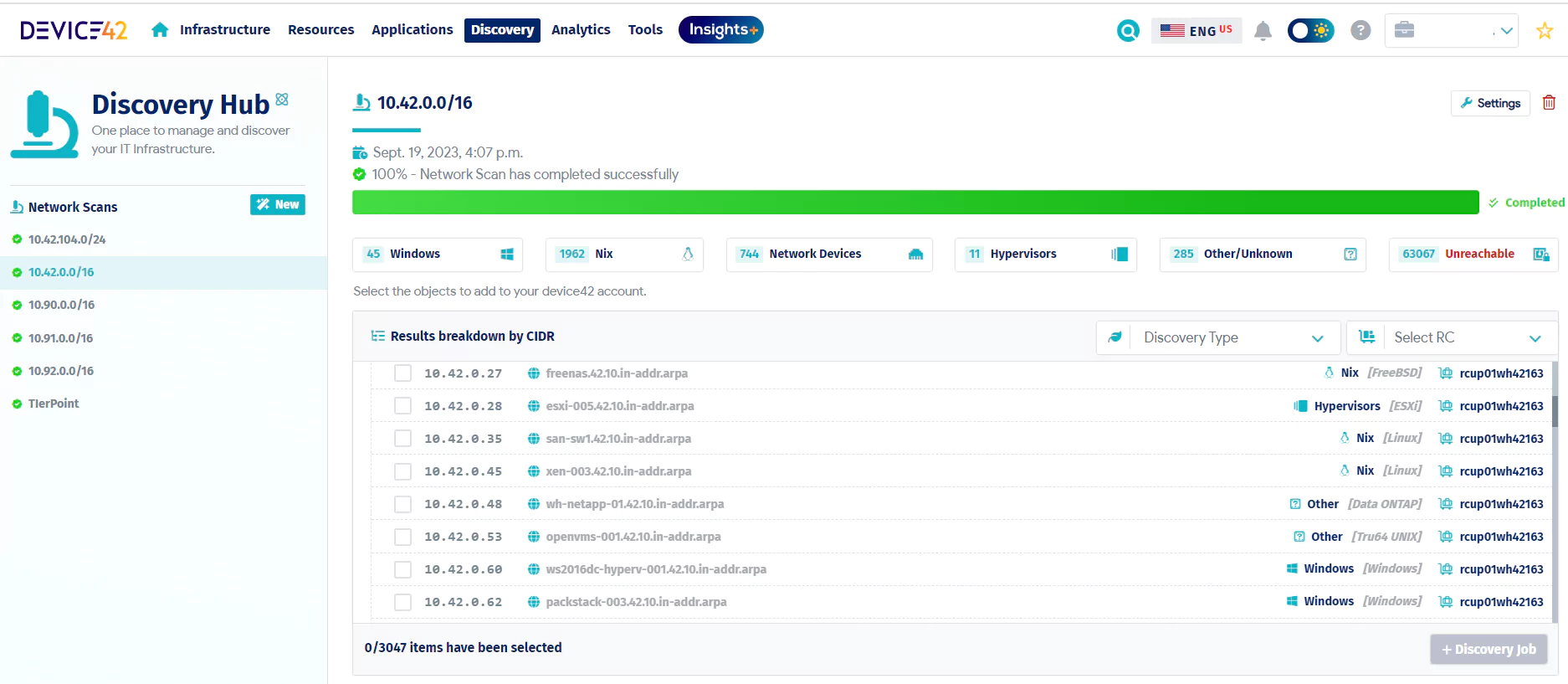
“With Device42, now we have more accurate information and a single source of truth, and furthermore, we are in the process of integrating Device42 with our ITSM platform.”
—Jimi V., LINZ CMDB Taskforce Leader
Your Single Source of Truth:
A Modern, Accurate, and Integrated CMDB
Device42’s Configuration Management Database (CMDB) provides a single source of truth by discovering all assets, enriching the data, mapping dependencies, and integrating to your existing tools for end-to-end visibility.
Device42 EnrichAI
Automated CMDB
Device42 CMDB gives you a continuously updated, accurate view of all assets, relationships, and dependencies across on premises, cloud, and hybrid environments. This unified visibility helps you reduce risk, improve IT operations, and support smarter decisions.
Integrations and RESTful APIs
Take advantage of out-of-the-box integrations with Freshservice, Jira Service Management, ServiceNow, Puppet, Chef, Infoblox, Splunk, and more. Easily export your data anytime, or import from almost anywhere. RESTful APIs make custom integrations easy, too!
Run IT with confidence.®

